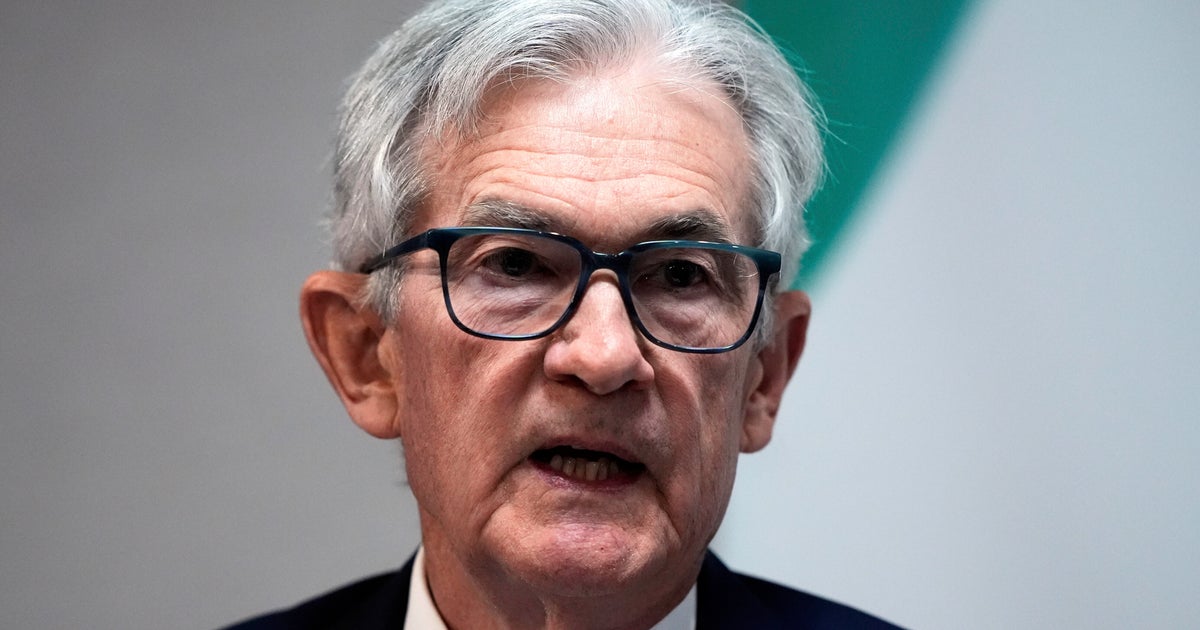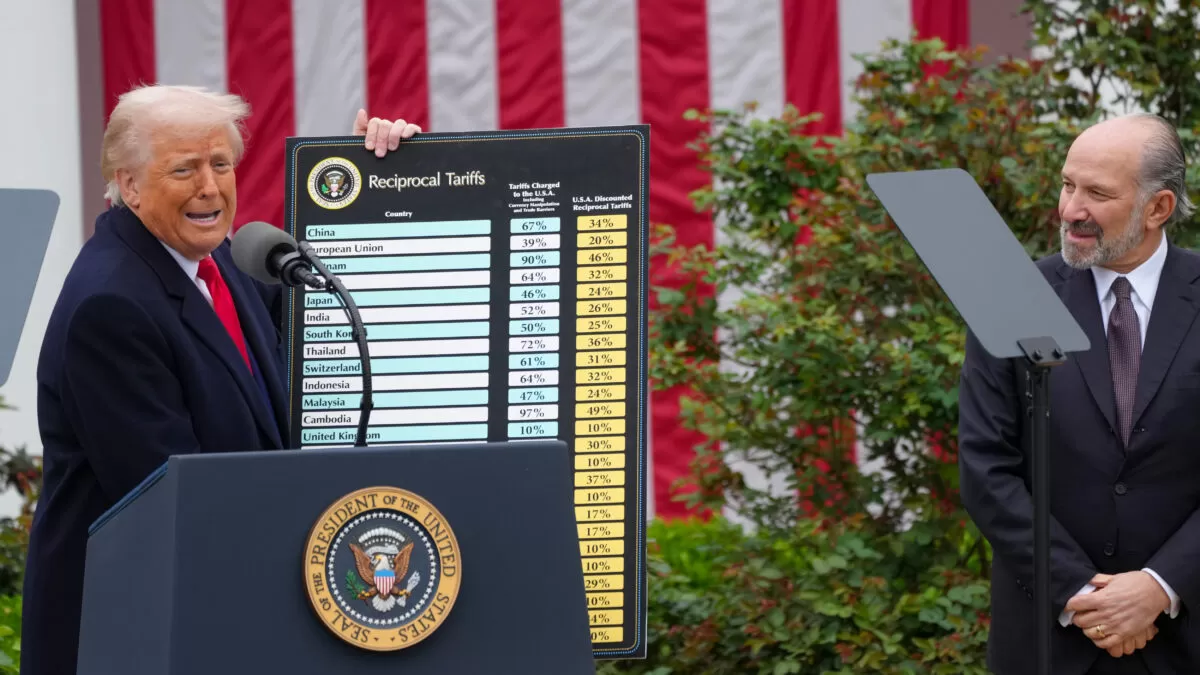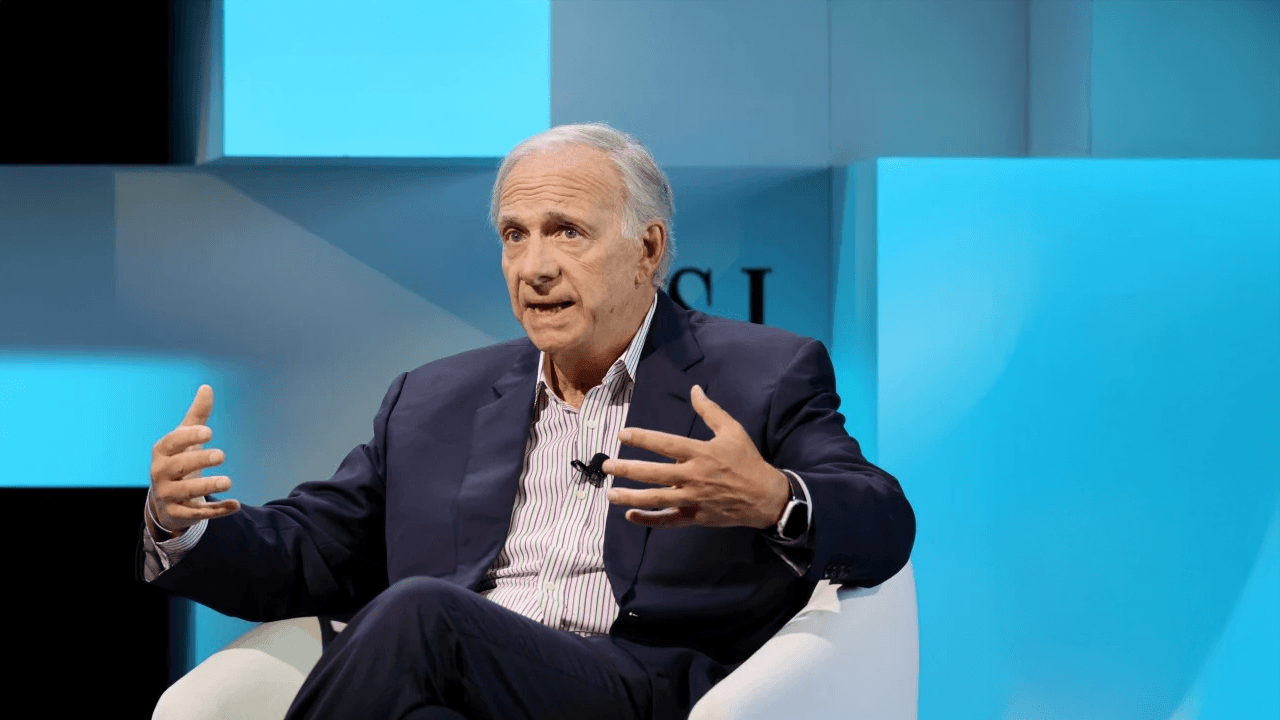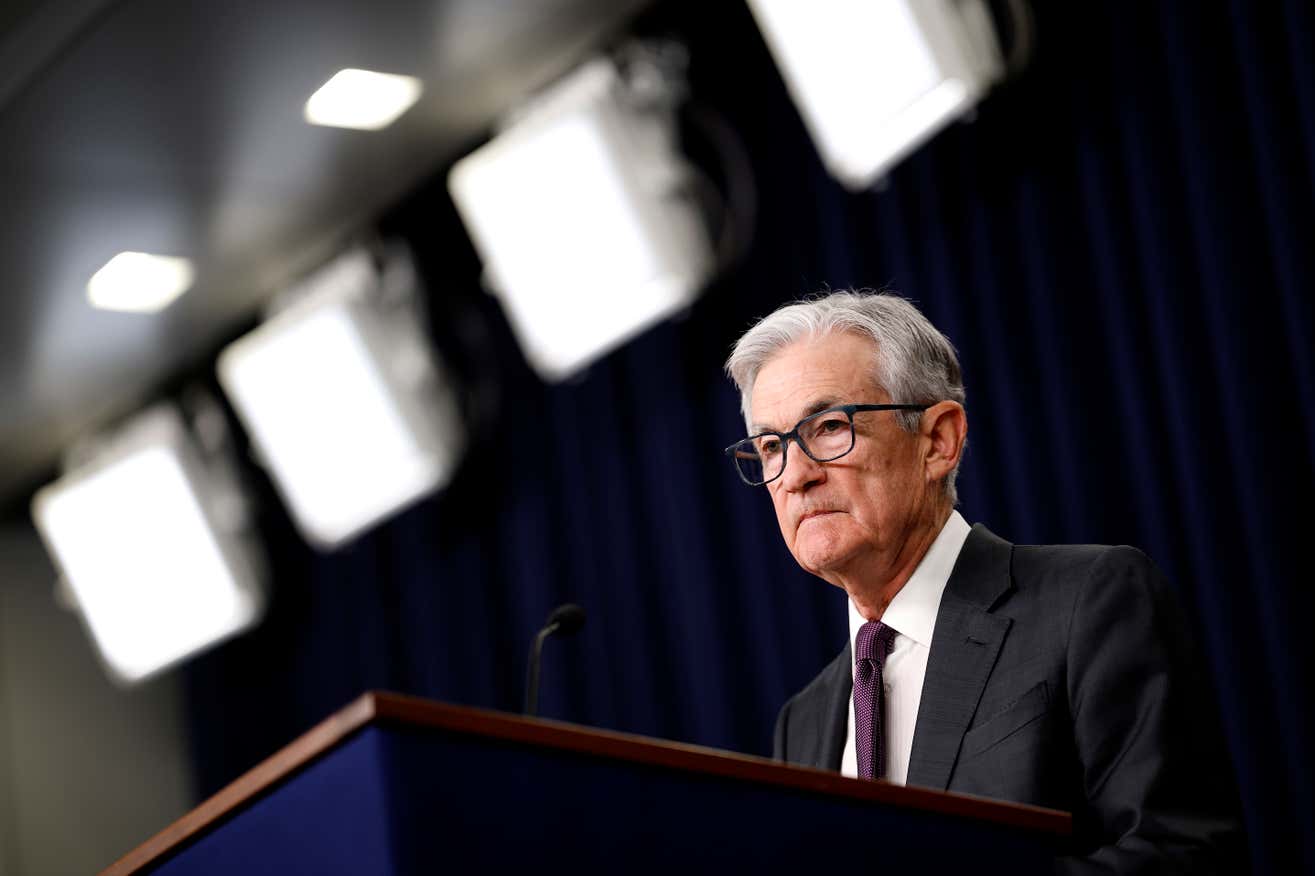from Forbes Breaking News
Trump’s Tariffs Will Likely Mean ‘Higher Inflation and Slower Growth’, Says Fed Chair
While the US economy remains robust, Jerome Powell cautions there is high uncertainty over its direction
by Callum Jones
The Guardian
 onald Trump’s global tariffs assault is set to raise prices and slow down economic growth, Federal Reserve chair Jerome Powell has warned, defying the US president’s demands for an immediate interest rate cut.
onald Trump’s global tariffs assault is set to raise prices and slow down economic growth, Federal Reserve chair Jerome Powell has warned, defying the US president’s demands for an immediate interest rate cut.
While the US economy remains robust, Powell cautioned that there is high uncertainty over its direction. “Downside risks have risen,” he told an event in Arlington, Virginia, on Friday.
The Fed chair stressed that the tariffs unveiled by Trump this week were markedly more extensive than expected – and warned the impact would likely be larger as a result.
Trump promised to bring down prices while campaigning to win back the White House last year, and erroneously claimed on Wednesday they were “way down”, despite inflation holding firm.
Here’s Why Experts Think Trump’s Tariffs Could Hurt the U.S. Economy
by Aimee Picchi
CBS News
 President Trump is promising that his April 2 “Liberation Day” volley of tariffs will “make America wealthy again” by repatriating manufacturing jobs and reviving demand for American-made products. But many economists are taking a different view, warning that the tariffs could lead to more dire economic scenarios, including a recession or stagflation.
President Trump is promising that his April 2 “Liberation Day” volley of tariffs will “make America wealthy again” by repatriating manufacturing jobs and reviving demand for American-made products. But many economists are taking a different view, warning that the tariffs could lead to more dire economic scenarios, including a recession or stagflation.
Mr. Trump has said the two new tariffs he unveiled Wednesday — a 10% universal duty on all U.S. imports and so-called reciprocal tariffs applied to imports from about 90 nations — will revitalize American manufacturing, create jobs and generate federal revenue.
But economists are ringing alarm bells as they digest the impact of the wide-ranging tariffs, which they forecast will accelerate inflation and dampen U.S. economic growth.
Economists Slash U.S. Growth, Boost Inflation Forecasts On Tariffs
Wall Street economists said the US risks a recession this year and inflation could return to pandemic levels following the Trump administration’s announcement of major tariffs on global trading partners.
by Matthew Boesler
Financial Post
 (Bloomberg) — Wall Street economists said the US risks a recession this year and inflation could return to pandemic levels following the Trump administration’s announcement of major tariffs on global trading partners.
(Bloomberg) — Wall Street economists said the US risks a recession this year and inflation could return to pandemic levels following the Trump administration’s announcement of major tariffs on global trading partners.
Nomura Securities International Inc. said it expects gross domestic product to expand 0.6% in 2025 after accounting for the new levies on imports, and a key measure of underlying inflation to rise to 4.7%.
Barclays Plc economists took a more pessimistic view toward GDP — projecting a 0.1% contraction — and a slightly more optimistic view of inflation, penciling in a 3.7% increase. They also look for the unemployment rate to climb by year-end.
Listen to the Here’s Why podcast on Apple, Spotify or anywhere you listen.
‘Liberation Day’ Tariffs Will Liberate People – From Their Income
Lower-income families who spend the largest shares of their income on goods—and who have been badly hurt from the recent inflation—will likely suffer the most.
by Veronique de Rugy
Reason.com
 We’re told that “Liberation Day” tariffs on imports from around the world will raise $6 trillion in federal revenue over the next decade, plus another trillion from automobile tariffs. But the only true “liberation” will be us Americans—consumers and taxpayers—being liberated from even more of our hard-earned income. So hold on to your wallet.
We’re told that “Liberation Day” tariffs on imports from around the world will raise $6 trillion in federal revenue over the next decade, plus another trillion from automobile tariffs. But the only true “liberation” will be us Americans—consumers and taxpayers—being liberated from even more of our hard-earned income. So hold on to your wallet.
If you don’t believe that Liberation Day is bad news for the overwhelming majority of us, first remember that U.S. consumers are, as always, the ones who pay U.S. tariffs. Whatever the Trump team collects from foreign imports will be shifted back to us in the form of higher prices.
Then there is the fact that the administration is already preparing for economic damage control with emergency aid for U.S. farmers.
On “Liberation Day,” Trump Signed America Up for Stagflation
Yesterday Donald Trump announced sweeping tariffs on all of America’s trading partners, with the explicit aim of “liberating” the US from unfair trade. Not only are these efforts confused, they will lock America in a cycle of stagnation and inflation.
by Dominik A. Leusder
Jacobin
 Yesterday Donald Trump announced what amounts to a dramatic escalation of the trade war initiated during his first term. Addressing a crowd of auto union workers at a Rose Garden event at the White House, the president revealed the details of his plan to reset the United States’ relationship with its trading partners, framing his tariffs as a “declaration of economic independence.”
Yesterday Donald Trump announced what amounts to a dramatic escalation of the trade war initiated during his first term. Addressing a crowd of auto union workers at a Rose Garden event at the White House, the president revealed the details of his plan to reset the United States’ relationship with its trading partners, framing his tariffs as a “declaration of economic independence.”
He began his speech with what amounted to a fever dream of American victimhood. Lamenting the “unilateral economic surrender” of his predecessors in the Oval Office, he decried being “looted, pillaged, and raped by friend and foe alike,” who “got rich at [America’s] expense” by way of “undervalued currencies,” “stealing our intellectual property,” and instituting “unfair rules and technical rules.” These trade barriers, whether tariff-based or not, were to be broken down. This effort would “supercharge the domestic industrial base,” while allowing the United States to pay down its national debt and reduce taxes.
The Dark Side of Tariffs: Dalio Predicts Global Stagflation and Economic Upheaval
Ray Dalio warns that Donald Trump’s tariff policies could lead to global stagflation and significantly alter U.S.- China trade relations. Dalio’s analysis highlights the “first-order” effects of tariffs, which can generate revenue but also reduce global production efficiencies.
by Jamie Redman
Bitcoin.com
 Dalio Backs Trump’s Tariff Revenue Claim
Dalio Backs Trump’s Tariff Revenue Claim
Ray Dalio, founder of Bridgewater Associates, has issued a stark warning about the economic impact of U.S. President Donald Trump’s newly unveiled tariff policies. Dalio stated that the tariff regime could lead to a surge in global stagflation and significantly reshape U.S.- China trade relations.
Dalio’s analysis, presented in a recent commentary, breaks down the “first-order” effects of tariffs. He notes that tariffs can generate revenue for the imposing country while reducing global production efficiencies. This perspective aligns with Trump’s Liberation Day speech, where he reiterated claims that revenues from tariffs made the U.S. wealthy before the introduction of income tax in 1913.
The Trump administration, by imposing reciprocal tariffs on both allies and adversaries, is confident that this measure, combined with spending cuts, will quickly transform the country’s deficit into a surplus.
Trump’s New Tariffs Put the Federal Reserve On the Spot Over Interest Rates – With Stagflation Looming
The trade war is likely to both depress the economy and boost inflation, requiring different responses from the central bank
by Josh Fellman
Quartz
 President Donald Trump’s new tariffs create a dilemma for the Federal Reserve because they’re likely to both increase inflation and slow economic growth — and possibly lead to stagflation.
President Donald Trump’s new tariffs create a dilemma for the Federal Reserve because they’re likely to both increase inflation and slow economic growth — and possibly lead to stagflation.
Economists are split between those who expect policymakers to focus on prices and therefore keep interest rates on hold for an extended period, and those who see the central bank prioritizing full employment and starting to cut borrowing costs.
Citi falls into the latter camp. “Officials will view an increase in inflation due to tariffs as a one-time increase in the price level that can be looked through,” the bank’s economists wrote in a note to clients. “That would leave Fed officials free to respond to softer growth conditions.” It expects 125 basis points of cuts this year, starting as soon as May.
How Investors Can Navigate Stagflation Worries Sparked by White House Policies
Investors are anxious about higher tariffs under Trump 2.0, including uncertain economic consequences after ‘liberation day’
by Christine Idzelis
Market Watch

The current White House policy mix is “unambiguously going to hurt U.S. growth in the short term,” or over the next six to 12 months, said Bob Elliott, co-founder, chief executive and chief investment officer at Unlimited Funds, in a phone interview. The policies — including tariffs, immigration restrictions and cuts to spending and the federal workforce — point to a “negative picture” for economic growth in the coming months, even if the longer-term outcome is less clear, he said.
For investors worried about the risk of higher inflation and slower growth leading to a stagflationary situation, gold typically outperforms relative to other asset classes in that environment, according to Elliott.
Inflation as a Centralizing Force
by David Brady, Jr.
Mises.org
 Which came first: the chicken or the egg? Inflation or the managerial class?
Which came first: the chicken or the egg? Inflation or the managerial class?
Inflationism is as much a tool as it is an ideology and a phenomenon. Inflation, of course, promotes consumption at the moment as prices change faster than incomes. It benefits borrowers at the expense of lenders. It benefits first and earlier receivers—those closest to the money spigot—at the expense of later receivers. It also provides the perfect tool for the managerial class that James Burnham and Sam Francis describe for the further expansion and centralization of power.
Their theory rests upon the idea that business and the state have become fused through a class of bureaucrats and managers working hand-in-hand. The Soviet Union and Nazi Germany were obvious examples, but Burnham also saw the New Deal as another. A flaw can be found in Burnham’s identification of the New Deal as part of the managerial revolution he observed, though.
Two Best Investments to Beat Inflation, According to Warren Buffett
by Adam Palasciano
Yahoo! Finance

Buffett has an estimated net worth of $165 billion as of March 31, 2025, according to Forbes. It’s clear that he knows more than a thing or two about how and what to invest in and how to shield your money against the effects of inflation.
Here are Buffett’s two investment recommendations for anyone looking to beat inflation.
